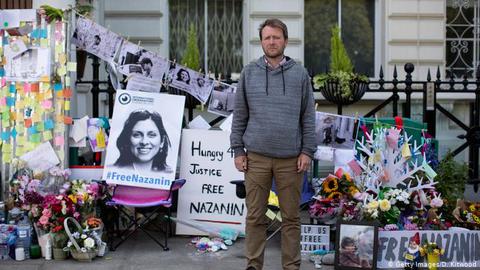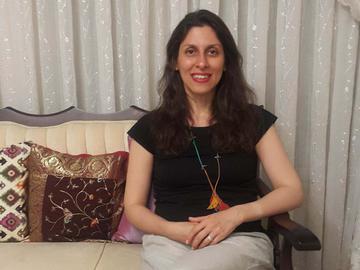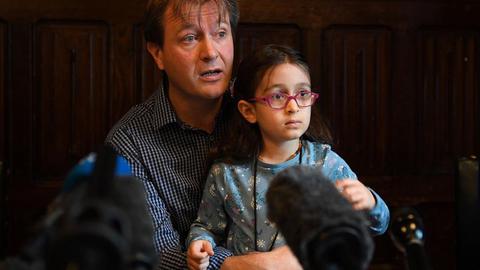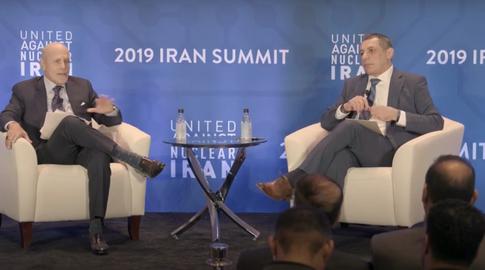The husband of Nazanin Zaghari-Ratcliffe has slammed international “inertia” over the practice of criminal hostage-taking in Iran, as a new IranWire documentary shed light on one case the regime would like to forget.
The Treacherous Host tells the abysmal story of Nizar Zakka, a Lebanese national who was kidnapped in Iran in 2015 and held in Evin Prison for four years on fabricated spying charges, before being released in an apparent prisoner swap.
Many other foreigners and dual nationals are still languishing behind bars in the Islamic Republic, with the regime apparently holding out for cash or concessions from foreign nations.
One of these is the British-Iranian charity worker Nazanin Zaghari-Ratcliffe, who was arrested at Imam Khomeini Airport in 2016 along with her 22-month-old daughter. She was sentenced to five years for alleged espionage at Iran’s notorious Evin Prison.
Her husband, Richard Ratcliffe, understands Nazanin is being held over a £450 million debt the UK has owed to Iran since the 1970s for a cancelled arms deal. The debt has not been paid because it accrued when Iran was under sanctions. For this reason, Nazanin’s detention is thought to be a means for Iran to discourage other states from adhering to the sanctions.
“There’s been a fundamental misdiagnosis,” Mr. Ratcliffe told IranWire. “Nazanin is not in prison because she did something the regime didn’t like. She’s there because they want their money back.
“It’s clear that’s why she was picked up in the first place. Nasanin’s imprisonment is a figleaf and the imprisonment is a figleaf. She is being held as a bargaining chip.”
From Evin Prison to House Arrest
Last October the couple’s daughter, Gabriella, was reunited with her father in London. Due to the Covid-19 risk in prison Nazanin was released on an electronic tag in March 2020.
Her family and lawyers have been agitating for full clemency to be granted in Nazanin’s case, based on the announcement made in March that the Supreme Leader would pardon 10,000 prisoners in the country to mark Nooroz (Iranian new year) 2020.
But the decision over clemency has been delayed over and over again, leading Mr. Ratcliffe to fear that the situation is stagnating. Nazanin also faces a second charge of “spreading propaganda” that hangs heavy over the current negotiations.
“Nazanin’s immediate release from Evin was euphoric,” he said. “Being able to speak to people and to see old friends she hadn’t seen for years on Skype, was a real uplift.
“But two things have gone on since. There’s the very stressful sense of limbo and having sleepless nights, which is debilitating in the long run, and there’ also an isolating quality to being on an ankle tag. Very few people dare visit her. In a sense, she has less contact than on the regular prison ward, like an extreme version of lockdown. That’s played havoc with her mental health.”
The electronic tag only has a reach of 300m, meaning Nazanin cannot currently get to any medical facilities in a situation her husband likened to house arrest or an “extreme version of lockdown”. She has been allowed to speak to the British Foreign Secretary and her local MP in London, Tulip Siddiq, but not to the media.
As in the case of Nizar Zakka, who never saw a single Lebanese official during his four years at Evin Prison, Mr Ratcliffe says the British authorities have been “singularly reluctant” to visit Nazanin – even while she is outside in Tehran – and have asked him to remain patient and “quiet”.
“They said Iran would regard [a visit] as provocative,” he said. “Good. It should be provocative.
“It’s good kidnapping logic to seclude people. We’re dealing with a regime that’s taking its own citizens hostage; it’s not going to stop doing this unless it’s challenged.”
In early August, Australian’s ambassador to Iran was allowed to visit the Australian academic Kylie Moore-Gilbert, who was also jailed in Iran on spying charges, at Gharchak prison. Gharchak is known as one of Iran’s most brutal and unsanitary detention centers and Dr Moore-Gilbert was reported to have been unwell inside.
Despite this, the Australian Department of Foreign Affairs stated: "Dr Moore-Gilbert is well and has access to food, medical facilities and books.” Friends and colleagues of Dr Moore-Gilbert publicly condemned Australia’s “quiet diplomacy” strategy, which they said was failing to help her.
“Why are they downplaying her suffering?” Mr. Ratcliffe said. “The logic behind it is ‘The more care we show, the more we’ll see the price go up’.
“But part of the dynamic of a kidnapping is conspicuous suffering. You make someone suffer to get the decision-makers to move. If you downplay it, the risk is that the person will be pressed to suffer more.
“There’s a limit to how much you can get one person to suffer. They may do something completely horrific, or they’ll just pick up someone else. It’s a path to more and more abuse.”
Less Talk, More Action
In July this year, Nazanin penned a furious letter to Iran’s foreign minister, Javad Zarif. Fertility tests carried out at her parents’ home in Tehran showed her chances of having a second child are vanishing as a result of her prolonged detention in Iran.
Mr. Ratcliffe said he cannot second-guess whether his “devastated” wife, whose treatment in Iran amounts to torture, will want to seek legal redress for the crimes committed against her when she is back home.
“Sometimes people want to get on with their lives,” he said, “sometimes people want to tell their stories, and in Nizar’s case he has made it a personal mission to make sure no-one gets left behind. When she’s home, it’ll be her decision.”
The Islamic Republic of Iran is a signatory of the UN Hostages Convention, by which states agree to prohibit and punish hostage-taking. Torture, including psychological torture, is prohibited worldwide and can amount to a crime against humanity when it forms part of a systemic practice.
“Talk is cheap,” Mr. Ratcliffe said. “There needs to be a cost to inertia. There need to be clear certain governments thinking hostage-taking is a good idea. There’s no cost to the IRGC or the Iranian government for hostage-taking. Until there’s a cost to there Iranian decision-makers, it’s going to continue.”
Related coverage:
The Treacherous Host: An IranWire Film
Nobel Laureate: It Takes Moral Courage to Speak Out
Jailed Briton's Daughter: If You're Real Muslims, How Can You Sleep at Night?
US Embassy Hostage Crisis Survivor: No-one is a Guest in Iran
Persecuted Lawyer: Nizar Zakka Had a Happy Ending, But We Did Not
Campaigners for Jailed Scientist: These Things Need to be Shown
Human Rights Advocate: Nizar's Story is All of Our Stories
visit the accountability section
In this section of Iran Wire, you can contact the officials and launch your campaign for various problems




























comments